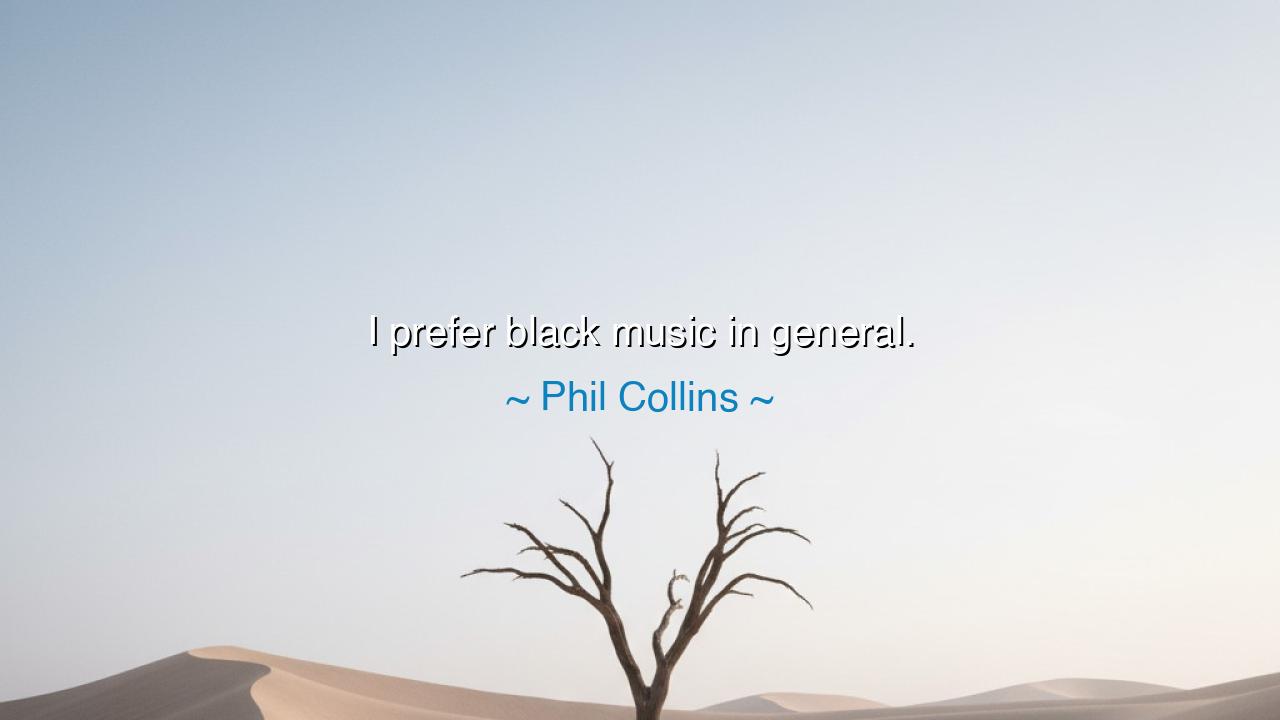
I prefer black music in general.






When the musician Phil Collins declared, “I prefer black music in general,” he was not speaking merely of taste, but giving honor to a tradition that shaped the sound of the modern world. For what is called “black music” carries within it the struggle of a people, the rhythm of survival, and the fire of the human spirit that could not be broken by chains, poverty, or injustice. To prefer such music is to be drawn toward authenticity, to choose the voice of the soul over the glitter of the surface, to walk with those who transformed suffering into beauty and resistance into song.
From the cotton fields of America rose the spirituals, sung by enslaved men and women who had nothing yet still lifted their voices to the heavens. These songs were cries of sorrow and also hymns of hope, telling stories of freedom, faith, and resilience. Later came the blues, born in the Mississippi Delta, giving sound to heartbreak and endurance. Then came jazz, gospel, soul, funk, rhythm and blues, and hip-hop—each one a mighty river flowing from the same ancestral wellspring. To say “I prefer black music” is to recognize the enduring power of these streams that have watered the roots of every modern genre.
Consider the story of Louis Armstrong, who rose from poverty in New Orleans to become one of the greatest voices and trumpeters the world has ever known. His music did not belong only to black America—it spoke to every nation, every ear, every heart. His genius revealed that black music was not a small corner of culture, but the pulse of the world itself. Or think of Aretha Franklin, the Queen of Soul, whose voice carried both the pain of a people and the joy of unbreakable spirit. When she sang, she gave not only entertainment but liberation.
Phil Collins himself, though rooted in rock and pop, drew inspiration from these rhythms. The drumbeats, the soulful chords, the heartfelt delivery—all bore the mark of black music’s influence. His words acknowledge a truth known by countless artists: that without the contributions of African and African-American traditions, modern music as we know it would be empty, stripped of its soul. This is the origin of the quote: it is a recognition of debt, an honoring of the foundation upon which his own art was built.
The meaning, then, is profound: black music is more than sound—it is history, it is testimony, it is the cry of the oppressed turned into the joy of the free. It reminds us that from suffering can rise greatness, from struggle can be born beauty, from silence can burst forth a song that changes the world. To prefer such music is to align oneself with authenticity, to choose the voice of truth over the noise of pretension.
The lesson for us is clear. We must not only consume the fruits of this tradition, but respect and honor its roots. To listen is not enough—we must understand. We must remember the people who carried this music through bondage, through segregation, through marginalization, and still gave it freely to the world. For when we enjoy jazz, blues, soul, or hip-hop, we partake of a legacy purchased with resilience and sacrifice.
Practical wisdom follows. Listen deeply—not only to the melody, but to the story beneath it. Learn the names of those who shaped these traditions. Support the voices who carry them forward today. And let this truth guide your own life: whatever your struggle, whatever your hardship, you too can turn pain into song, difficulty into rhythm, trial into testimony. For that is the eternal teaching of black music.
Therefore, let us hold fast to Phil Collins’ confession. “I prefer black music in general.” Not as a matter of mere taste, but as a recognition of power, authenticity, and truth. For in black music lies the story of humanity’s deepest pain and its highest hope. And to walk with that music is to walk closer to the heart of what it means to be truly alive.






AAdministratorAdministrator
Welcome, honored guests. Please leave a comment, we will respond soon